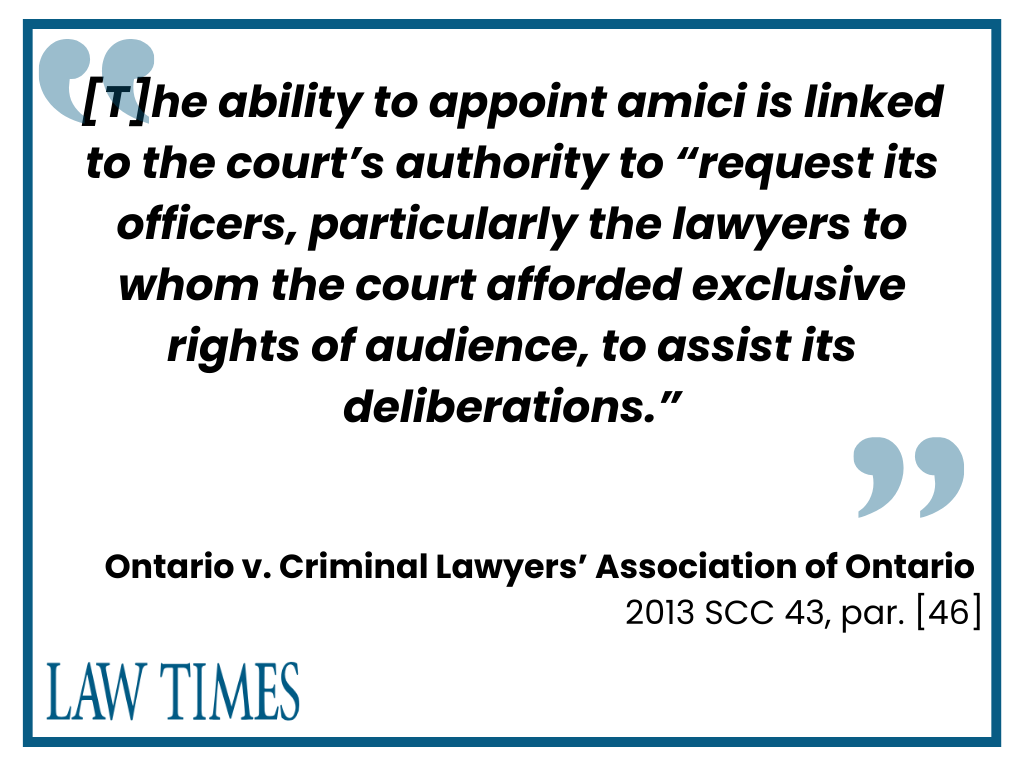
While the involvement of an amicus curiae is crucial in some cases, there are a lot of things to consider when the court appoints one

Friendly faces do not come easily in courts, especially in contentious cases and those where parties seem very hostile to each other. However, literal friends of the court such as an amicus curiae provide added and neutral input to the court that can ease some of the tension. In the end, they are an important part of the judicial process and in settling the issues raised before the court.
This article can be for lawyers and law students who need more clarity on what an amicus curiae does and what case law says about their functions. This can also be used by parties in a litigation where an amicus has been appointed, so they would know who these legal professionals are and what happens next.
Amicus curiae is the Latin term that literally means “friend of the court.” Historically, an amicus is a disinterested person that appears during court proceedings to share their knowledge of the law and how it applies to the case at bar. Over time, the roles of the amici curiae have evolved. Their roles also depend on each jurisdiction and their court rules.
In Canada, an amicus curiae is a court-appointed lawyer, who leads the court to arguments which may have been overlooked by the parties. For instance, they may refer to the court some facts or laws that were not presented by any of the parties to the case. What's important when calling an amicus is that they’re:
As an example, here’s the discussion involving one of the amici curiae in the case of Bell Canada v. Canada (Attorney General), 2019 SCC 66, before the Supreme Court:
The best lawyers in Canada are the ones who are usually called to become an amicus curiae. Know more about them in this Special Reports per practice area published by Canadian Lawyer Magazine, one of our sister publications.
An amicus curiae can do many things for the court, but not without certain restrictions. These roles and limitations are found in case law, which can guide the court and the parties whenever an amicus is to be appointed.
Since an amicus curiae is a friend of the court, it follows that their powers and responsibilities are under the court’s hands:
Related to this is the fact that because the court has power over the amicus, it’s also the only one that can discharge them. It’s not for the parties to decide whether to remove an amicus, although they’re not prevented from voicing their objections to the court.
While the court has the leeway on the role of amicus curiae that it appoints, it is also guided by case law when it comes to the definite role that an amicus can play. By way of example is the case of R. v. Brown, [1999] OJ No 4866, where the role of the amicus appointed in this case was very limited, such as the following:
However, case law has also recognized that there are times when the roles of an appointed amicus can be expanded. As such, the wide latitude of determining what specific role/s an amicus can only do in a trial is given to the judge. In R. v. Kahsai, 2023 SCC 20, two amici curae were appointed by the court when the accused in a criminal case refused to be represented by counsel. These two amici played different roles:
The Kahsai case has also reiterated the long-standing prohibition of amicus curiae to act as a lawyer for the accused. While an amicus can function like a defence lawyer to “oppose the position of the Crown where the accused is unrepresented,” their roles are still limited to some degree:
In addition, it was pointed out in Kahsai that the appointment of an amicus must neither:
Various reasons float during a trial that can force the courts to appoint an amicus. While the main reason can be one of the parties being self-represented or unrepresented by counsel, there is a lot more to this than just the mere absence of counsel.
One of the common reasons for appointing an amicus in the lower courts is when one of the parties is unrepresented or self-represented. In this case, an important issue or argument, which might be influential as the court decides the case, might not be raised at all by either party.
Worse, both parties may be unrepresented or self-represented, which makes it difficult for the court to craft a decision due to the lack of input from the parties. To prevent the miscarriage of justice, the court can appoint amici based on its sound discretion.
The complexity and uniqueness of the issues raised by the parties may prompt the court to ask for help from several amici curiae. The case of Reference re Secession of Québec, [1998] 2 S.C.R. 217, is one of the cases which calls for assistance of an amicus curiae.
This is in addition to the non-participation of the Québec government in this case, for which the amicus made its arguments on its behalf had it participated in the proceedings. Suffice to say that the importance of this case, and hearing all sides, necessitated an amicus.
The case of Ontario v. Criminal Lawyers’ Association of Ontario, 2013 SCC 43, gave two conditions to guide the courts when appointing an amicus curiae:
The Court also cautioned that the routinary appointment of an amicus, just because one party is unrepresented, runs the risk of crossing the line between the judge’s need for assistance and the province’s constitutional responsibility of administering justice.

The conditions mentioned in Criminal Lawyers’ Association of Ontario, which are applied to criminal cases, are adjusted when appointing an amicus in private family law cases. These are laid down in the case of Morwald-Benevides v. Benevides, 2019 ONCA 1023:
These are not exhaustive, since the judge in a family case is given the choice whether the appointment of an amicus would be helpful or not.
Case law has repeatedly highlighted that amici curiae must be impartial, and there are a lot of angles to look at it. In sum, an amici curiae:
When the courts see a hint of impartiality, they can refuse the appointment of an amicus or remove them even after their appointment. The party can also ask the court for such refusal or removal based on the grounds of impartiality.
Aside from the cases mentioned above which define the roles of an amicus, and the reasons that warrant their appointment, case law has touched on the topic of fees for an amicus.
One concern when appointing an amicus in Canada are the payment of their fees — who has ultimate authority that can fix their fees? This was one of the main discussions in the case of Criminal Lawyers’ Association of Ontario. Here, the issue was whether the judge could fix the fees of the amici it appointed that is higher than the legal aid rates and order the Attorney General to pay these fees.
Before touching on the discussion of fees, the Supreme Court again acknowledged the inherent jurisdiction of courts to appoint an amicus in criminal cases. It also said that when an amicus takes the role of a defence counsel, they’re “no longer a friend of the court.”
However, the Court ruled that when it comes to the fees of an amicus, the right to fix such fees is reserved for the Attorney General, and not with the courts. To add, the Court does not see that such inability would hamper the court’s appointment power of amici.
When they’re at a loss, or due to the specific circumstance of a case, the court is not barred from seeking assistance from their “friends,” such as an amicus curiae. They are an important part of Canada’s judicial system, helping the courts reach fair and guided decisions.
Surely, Canadian jurisprudence is still evolving when comes to an amicus curae’s judicial participation. As such, we’ll expect that there will be more delineation (or expansion, maybe) on what roles they can play in the court and what they can do for parties in a litigation.
By understanding amici curiae, legal professionals can handle better cases where their unique functions may be invoked, to protect the fairness of the judicial process.
Do you have questions about the roles of an amicus curiae in Canadian courts? Let us know in the comment section below!